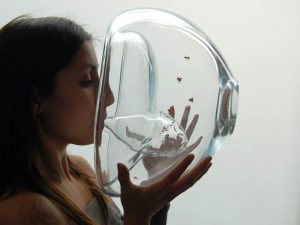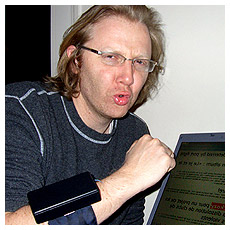 Christophe Bruno is a French net-artist (yes, like in net.art) based in Paris. His mostly web-related work deals a lot with questions related to language and has been widely shown. He gained a lot of recognition for his “AdWords-Happening” with which he has won a honorable mention at the 2003 Ars Electronica. He’s had his first solo-show at the gallery Sollertis in Toulouse and recently he was invited to Transmediale 06, where his “Human Browser” attacked the unsuspecting art-crowd with her googled ramblings. Being so prolific and funny, it’s about time that we take a closer look at Monsieur B!
Christophe Bruno is a French net-artist (yes, like in net.art) based in Paris. His mostly web-related work deals a lot with questions related to language and has been widely shown. He gained a lot of recognition for his “AdWords-Happening” with which he has won a honorable mention at the 2003 Ars Electronica. He’s had his first solo-show at the gallery Sollertis in Toulouse and recently he was invited to Transmediale 06, where his “Human Browser” attacked the unsuspecting art-crowd with her googled ramblings. Being so prolific and funny, it’s about time that we take a closer look at Monsieur B!
Sascha: Can you tell in a few sentences what most of your work is about?
Christophe Bruno: If you look at my work, I guess you will find that it mostly deals with the idea of diverting global symbolic structures like Google search engine, news portals or the blogosphere etc. I made quite a few pieces using language as a medium, but trying to grasp what I thought had been renewed by the rise of the Web: Semantic capitalism, Joycean epiphanies or formerly…
I also made some pieces about the question of the image, but always in relation to language or to some critical context, like fascinum or non-weddings
Then I’ve been exploring wireless technologies, as in WiFi-SM. But I think that parody (well it’s not a parody anymore since I built the device since then) also tells you something about my position concerning the relation I see between art and technology. I have strong attachments to the original net.art movement but I don’t consider myself as a digital artist, term which doesn’t mean anything to me.
S: When you talk about global symbolic structures and semantic capitalism, in how far do you believe this is having a major impact on more than the way that people communicate? Will an Internet of things make a difference?
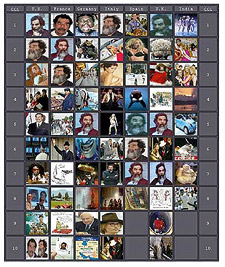 C.B.: I guess that the Web, and Google more precisely, have been the revelators and accelerators of some large-scale trends that existed before in a latent way. Looking at the relations between money and language, the first clear occurence I found was in a poem by Stephane Mallarmé, called “Crisis in verse”, in 1887, where he compares the use of language to the exchange of coins of money, passed on from hand to hand in silence. This amazing intuition opposes a prosaic use of language to what he redefines as poetry, evoking «la disparition élocutoire du poête»: the vanishing of the poet behind the words.
C.B.: I guess that the Web, and Google more precisely, have been the revelators and accelerators of some large-scale trends that existed before in a latent way. Looking at the relations between money and language, the first clear occurence I found was in a poem by Stephane Mallarmé, called “Crisis in verse”, in 1887, where he compares the use of language to the exchange of coins of money, passed on from hand to hand in silence. This amazing intuition opposes a prosaic use of language to what he redefines as poetry, evoking «la disparition élocutoire du poête»: the vanishing of the poet behind the words.
All this renews the question of speech (I’m not talking here about freedom of speech, although it is related, but speech as the undecidable root of the human subject). What is speech at the “age of access”, at the age of globalization and “taylorization of discourse”? We probably face the achievement of some long-term process, from the Enlightenment and Jeremy Bentham, to the possible total implementation of the Panopticon, for which the Internet is one of the main vectors, invading all fields of human condition. I don’t know whether the Internet of things will add anything new on the conceptual level; it will probably make this prison more tangible…but there will be more fun as well when your toothbrush will get a semantic virus.
S: Did you have Joyceean epiphany yourself at some point – did something unexpected emerge from your work, making you realize something fundamental?
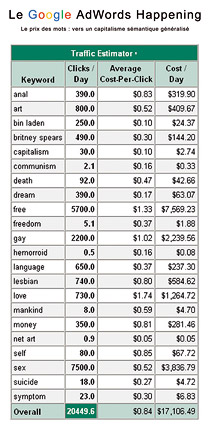 C.B.: The Google AdWords Happening was fundamental to me at least…and unexpected; it wasn’t like an epiphany, but it was a real transition in my life. But I don’t believe too much in the transmissibility of what I did, even if it seems to have some character of universality; everyone has to make their own experiment and their own choice at the end. I think the value of what happened in the AdWords Happening lies in the fact that it reaches some impossible point: the point where speech, in front of its own vacuity, its own gap, fails to match what we call communication, where capitalism transforms into commodities the ultimate atoms of mankind, words… Slaves, they still could escape in their dreams. But what Google et al offer, is to monitor our very dreams. They most certainly won’t succeed. But when will we realize all that?
C.B.: The Google AdWords Happening was fundamental to me at least…and unexpected; it wasn’t like an epiphany, but it was a real transition in my life. But I don’t believe too much in the transmissibility of what I did, even if it seems to have some character of universality; everyone has to make their own experiment and their own choice at the end. I think the value of what happened in the AdWords Happening lies in the fact that it reaches some impossible point: the point where speech, in front of its own vacuity, its own gap, fails to match what we call communication, where capitalism transforms into commodities the ultimate atoms of mankind, words… Slaves, they still could escape in their dreams. But what Google et al offer, is to monitor our very dreams. They most certainly won’t succeed. But when will we realize all that?
S: Google Thoughts? Pretty heavy dystopian thinking here and exactly diametrical to what for instance Joi Ito is preaching about the Internet as a chance for the individual to regain his or her voice. How do you think these two views relate to each other? Hasn’t the Internet done more for the written word than anything else since Herrn Gutenberg?
C.B.: Googlethoughts.com is available by the way ;-) It’s clear to me that the history of Internet goes from utopia to dystopia. It started with a hope about sharing ideas, sharing media, free speech etc. and ended (well it’s not over of course) with the commodification of language. On the political point of view, there is a clear will, from any power, to lock some of the libertarian aspects of the Internet. But what interests me are the economic dynamics that are in play here and how they interact with the political and social context. For instance, the relation of Google to free speech is very interesting: in fact free speech is the precondition for them to track and analyse the intimacy of the millions of bloggers (as you know, Google bought Blogger in 2004). In other words Google’s ethics of free speech (although they sacrificed this rule in China) lies in its economic dynamics, they need it to optimise their adwords/adsense system. While we are blogging, Google is earning money, as everybody should know now. Finally the information they extract about ourselves will be sold to the spectacular media and marketing, in which we are all embedded. Do you see any place for the voice of the individual here? Personally I don’t as soon as speech has to obey these economic laws, because the question is not whether to speak or not to speak here, the question is about the diffusion and the effect of your speech (I think it’s quite clear in the AdWords Happening). I called this loop mechanism between control and spectacle, the “Taylorisation of speech”.
Of course, sometimes the speech of an individual has some effects: but they mostly come from the hijacking of these global structures (hoaxes etc.), and not from their utilitarian use.
S: You had been invited to Transmediale 06 with your Human Browser. I was pretty scared by your actress when she suddenly popped up behind me, but looking at the videos on your site I must admit that it’s hilarious. It fit well to the motto of the event, since it was about humor and reality. Can you explain this work a bit? Is it more of a parody or do you want to evaluate how much sense you can produce by googling the world?
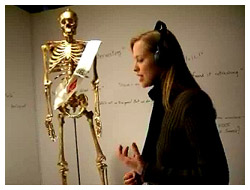 C.B.: Oh you were there? Sorry she scared you ;-) Well, contrary to WiFi-SM, Human Browser is not a parody. It’s a proposal for a new level of existence: just as Frankenstein’s monster is made of a patchwork of parts of dead bodies, Human Browser’s speech is constituted by bribes of dead discourses coming from different subjects. I managed to fine-tune the program so that it’s indeed funny from time to time, in an ocean of boredom, with a strange mix of randomness and control.
C.B.: Oh you were there? Sorry she scared you ;-) Well, contrary to WiFi-SM, Human Browser is not a parody. It’s a proposal for a new level of existence: just as Frankenstein’s monster is made of a patchwork of parts of dead bodies, Human Browser’s speech is constituted by bribes of dead discourses coming from different subjects. I managed to fine-tune the program so that it’s indeed funny from time to time, in an ocean of boredom, with a strange mix of randomness and control.
S: But it’s kind of obvious that Google’s output would be pretty random since it doesn’t really know your human browser’s surroundings, isn’t it? How do you assess her context? Are archived discourses really dead or do they just sleep?
C.B.: Maybe I should explain more the technical aspects of the performance: thanks to its headset, the actor hears a text-to-speech audio that comes directly from the Internet in real-time. The textual flow is fetched by a program that hijacks Google. Depending on the context in which the actor is, I send keywords to the program (thanks to a WiFi PDA) and these keywords are used as search strings in Google, so that the content of the textual flow looks always related to the context. Of course we can very well imagine that in a few years, there will be so many RFID, surveillance nanocameras and speech recognition that it will be possible to automatize even more this process. It’s funny how we get used to nightmares.
And otherwise you’re right : archived discourses just sleep… and Human Browser is dreaming.
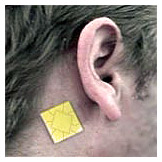 There is a very long sequel of myths, theories or infantile sexual theories that describe the transition from non-human (gods, animals, machines..) to human, from inanimate matter to life, how machine could imitate man or woman etc.: Prometheus/Pandora, Oedipus, Frankenstein, Pinocchio, Turing… But in fact you have to reverse the myths: the real, irreducible problem, the one science cannot answer, is: up to what point will man have to imitate the machine to go on with his social existence?
There is a very long sequel of myths, theories or infantile sexual theories that describe the transition from non-human (gods, animals, machines..) to human, from inanimate matter to life, how machine could imitate man or woman etc.: Prometheus/Pandora, Oedipus, Frankenstein, Pinocchio, Turing… But in fact you have to reverse the myths: the real, irreducible problem, the one science cannot answer, is: up to what point will man have to imitate the machine to go on with his social existence?
S:Looking at the Japanese robot recently posted by Konomi, this is also diametrical to your belief, isn’t it? Can you elaborate a bit more on how you think that man will have to adapt to the machine? In terms of language?
C.B.: I don’t think she’s diametrical to my belief at all ;-) But I have no idea how to answer your question. I will only complete my remark about the machine with the following ones, so that things become even less clear ;-)
The Turing test is a myth that reproduces the mythological strory of Prometheus. It almost has the same structure (see my article on Cosmolalia).
The Turing test is also very similar to the “prisoner’s dilemma“, as commented by Jacques Lacan in 1945 in “Le temps logique et l’assertion de certitude anticipée”. But in this version, there is no machine, only human subjects.
Pop Art brings an ironic answer to the Turing test. For instance the famous quotation by Warhol :”I want to be a machine etc.”
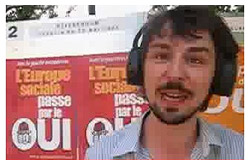 Google.art, let’s call it like that, brings its own questions about the promethean myth of the separation between man and machine, which is nothing but the long term question: what is the Subject of speech?
Google.art, let’s call it like that, brings its own questions about the promethean myth of the separation between man and machine, which is nothing but the long term question: what is the Subject of speech?
S: Since you’re French, we’re interested how so-called new media art is doing there! Is it popular with both the general public and the art world? Does Canada play a role in funding French-language projects?
C.B.: I don’t really like these classifications of “new media art” or “digital art”, so it’s not easy for me to answer your question… Anyway I’m not sure that an event of the importance of Transmediale could happen in France for instance, but when so-called new media artists have a chance to present their work, the public is often quite receptive. Last month, I had my first solo exhibition in a contemporary art gallery, in Toulouse and I’m quite happy with the way things turned out…
On the artistic point of view I don’t care about the perennation of digital art. It means nothing to me. And the Internet will at some point become as commonplace as “space” or “time”, so that “Internet art” might loose any signification.
What could worry me more, in France but I guess it’s the same anywhere, is that “net.art”, the original artistic movement, which commit suicide in 1998, and which constitutes the real historical breakthrough, is often not really recognized or remembered as such. I think it’s important that it is not swallowed by this “digital art” category, whose aim seems to be the rewriting of art history. But contemporary art doesn’t care that much about what kind of media you deal with (well it cares, but not in such a discriminatory sense), in France nor in any country. And that’s a good thing.
And finally: Canada. Yes, maybe I should apply for funding there, but I would have to translate all my works in french ;-)



